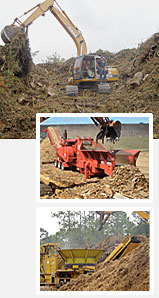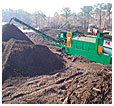BioCycle October 2006, Vol. 47, No. 10, p. 29
Cleaning, staging and drying feedstocks prior to grinding are critical steps in meeting specifications established by mills for boiler fuel.
Nora Goldstein
 AFTER Jason Thompson was honorably discharged from the Marine Corps in 1996, he moved to Wilmington, North Carolina. Shortly after, Hurricanes Fran and Bertha came through and damaged a number of trees in his yard. Thompson hired a tree care specialist to do the repairs but in the process, realized that was a career he was interested in pursuing. “I took classes and became a Certified Arborist,” he recalls. “I started my company, American Property Experts, and quickly noticed that I was paying a lot of money to take the wood waste resulting from tree care to the landfill for disposal. I figured there was a smarter way to handle that material, so ended up purchasing a piece of property where I could stockpile the trimmings and eventually process them.”
AFTER Jason Thompson was honorably discharged from the Marine Corps in 1996, he moved to Wilmington, North Carolina. Shortly after, Hurricanes Fran and Bertha came through and damaged a number of trees in his yard. Thompson hired a tree care specialist to do the repairs but in the process, realized that was a career he was interested in pursuing. “I took classes and became a Certified Arborist,” he recalls. “I started my company, American Property Experts, and quickly noticed that I was paying a lot of money to take the wood waste resulting from tree care to the landfill for disposal. I figured there was a smarter way to handle that material, so ended up purchasing a piece of property where I could stockpile the trimmings and eventually process them.”
After six months, the stockpile grew fairly large, and Thompson was required by the state to obtain a yard waste processing permit if he wanted to keep the site open. The company hired a contract grinder to process the material, but then decided to purchase its own equipment. “We started out with a Vermeer TG400 tub grinder,” says Thompson. “Then, as various market opportunities emerged, especially with wood fuel, we purchased more grinders. Our fleet now includes the Vermeer, and two Morbark 1300 tub grinders and a 5600 horizontal grinder.”
In 2005, American Property Experts recycled about 147,000 tons of wood and green waste. The company focuses primarily on materials processing and marketing, although it does offer land clearing services where it transports the grinders and processes the cleared materials on-site. The bulk of incoming materials, however, comes from other land clearing companies, and contracts with municipalities to receive yard trimmings collected through curbside programs. “Our permit does not allow us to compost on our site, so the bulk of what we do is biomass/boiler fuel production,” he notes. “We also do specialty mulches – double and triple ground and colored – but fuel to energy is 99 percent of our market.”

In August, the company opened a second site that focuses more on aggregate recycling than wood recycling. “We went through an extensive, five year planning process, and decided to expand more heavily into the recycled aggregate market,” says Thompson. “We receive concrete, asphalt, brick and blocks from demolition companies and road construction contractors. We purchased a Crushking stone plant to process concrete, which can be used in a mix for road base.”
SORTING PROCEDURES, FUEL SPECS
Scales are installed at both sites to weigh loads coming in and going out. Incoming loads are inspected for contaminants; the company also installed cameras to take pictures of loads. Trucks proceed to the processing area where they unload. An excavator is used to pull out contaminants (haulers get fined $75 on the spot if any plastic bags with garbage are removed). A bulldozer with a rake is used to shake the dirt off of land clearing debris. The soil is screened in a McCloskey Bros. trommel and then sold. “The native soils are all sand and clay, so there is demand for screened topsoil,” says Thompson.
All woody products are staged in stockpiles to dry prior to grinding. “We supply four or five mills with biomass,” he adds. “While each has its own spec, the main thing they are concerned about is moisture content. They do not want to buy water. Our ground wood is at 47 percent moisture, which is very low for green waste. That’s why we stage and dry the product before grinding it.”
To evaluate moisture content of its fuel supply, mills will do a burn test on the material. One of the paper mills American Property sells product to recently conducted a burn test on its chips. “The results were 5.2 percent ash after the burn out, and the mill was looking for 7 percent ash or less,” he explains.

The ground wood needs to be 2-inch minus in size and scope for most of the mills in the region served by American Property. The company achieves the 2-inch minus size in one grind, whereas other processes will do double grinding. “Our grinders are the most expensive equipment to operate,” says Thompson. “That is why we are very stringent about presorting and stacking feedstocks prior to grinding. Not only does that lower mechanical failures, we get a better overall return on investment. The result is a high quality fuel that we can market for a good price.”
Mills sign one, two or three year contracts with American Property Experts for the biomass fuel supply. The price per ton fluctuates based on how far the company has to travel to get to the mills. The company has a fleet of walking floor trailers to transport chips to mills as well as from on-site land clearing jobs. Generally speaking, notes Thompson, the company receives $15 to $20/ton for ground wood that meets the specifications. “That is why we sell close to 150,000 tons/year to that market.”
DISASTER DEBRIS MANAGEMENT
Wilmington, North Carolina, where the company is located, has had its share of hurricanes – six in eight years that have hit the area directly. Responding at the local level has prepared American Property Experts to “pack up and go” when called. The company is qualified as a processing contractor with a number of the large companies that get general contracts to handle big disasters. It can mobilize its grinder, excavator and bulldozer in three hours, and has traveled as far south as Savannah, Georgia and as far north as Richmond, Virginia to assist with hurricane clean-up.
“FEMA usually designates drop off areas for hurricane debris and we move to those sites and grind,” says Thompson. “Often times, some ground wood is used for boiler fuel and some is used by the counties’ Parks and Recreation Departments for public grounds landscaping or maintenance projects. When hurricanes are local, most of the debris is brought right to our site, which allows us ample drying time to meet our clients’ fuel specifications.”
October 25, 2006 | General










